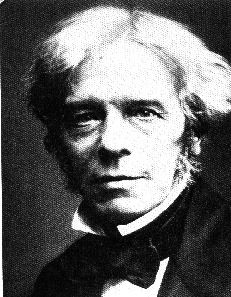Experimental Researches in Electricity
in three deluxe volumes
by Michael Faraday
Sold only as a set of three volumes.
Publication date, November 2000.
For pricing and ordering information, see the ordering section below.
 A handsomely-bound facsimile reprint of the three-volume first edition of Faraday's great work on electricity and magnetism
A handsomely-bound facsimile reprint of the three-volume first edition of Faraday's great work on electricity and magnetism
The Experimental Researches in Electricity is a series of articles, originally published in scientific journals, presenting Faraday's work on electricity and magnetism over almost a quarter of a century. In it, Faraday argues masterfully for a radically experimental approach to nature, in the course of which he evolves many of the concepts and terms that have come to be fundamental to our understanding of electricity. Faraday's elegant prose style and his avoidance of mathematics and technical jargon make the work remarkable accessible to all readers, scientists and nonscientists alike.
This wonderful work, which had been out of print for some time, challenges the dominant Newtonian mathematical paradigm that was then being applied to electrical phenomena by Ampère and other physicists. Faraday proposes an alternative vision, in which carefully designed and skillfully executed experiments allow natural laws to be revealed directly and unambiguously, with a minimum of theoretical presuppositions.
Features
- Facsimile reprint of the first edition
- Complete and unabridged, with Faraday's indexes and plates
- This is not a typical reprint! The first edition text was painstakingly photographed and each page individually cleaned up.
- Total of 1536 pages plus oversized plates in pockets affixed to inside back covers
- Smyth sewn binding, covered with deluxe Rainbow 9 binding material, highest quality heavy acid free paper
Comments on Faraday's Work
If by anything I have here written [in the Treatise on Electricity and Magnetism] I may assist any student in understanding Faraday's modes of thought and expression, I shall regard it as the accomplishment of one of my principal aims — to communicate to thers the same delight which I have found myself in reading Faraday's Researches.
— James Clerk Maxwell
author of Treatise on Electricity and Magnetism
What then is Faraday's concept of science? It is evident that he is not merely an experimentalist, cleverly providing data for theoreticians to work up into theories. On the contrary, Faraday had one of the most fertile and insistent of speculative minds; in a certain sense, he was constantly producing new hypotheses and his mind was constantly reasoning from them. The result of this, reported in the thousands of paragraphs of the Experimental Researches and the still more numerous paragraphs of the Diary, is not theory, but a vast weaving and unweaving of powers, a process of discovery and identification, a great, highly unified formulary for the production and classification of effects. Faraday, as Tyndall proclaimed and all the world agreed, is the great "discoverer"; the paradigm for Faraday is Odysseus rather than Euclid: he travels from land to land, reporting wonders, guided by legend and myth, rumor or divine love. For Odysseus, the dominant desire is to see men's cities and to know their minds, and to gather all this together in the return to Ithaca. For Faraday, it is to investigate all the powers of nature, and to unveil them as essentially one, in the lecture hall on Albermarle Street. If Faraday did not learn this from Homer, he was moved to it by Dr. Watts:Let the hope of new discoveries, as well as the satisfaction and pleasure of known truths, animate your daily industry. Do not think learning in general is arrived at its perfection, or that the knowledge of any particular subject in any science cannot be improved, merely because it has lain five hundred or a thousand years without improvement. The present age, by the blessing of God on the ingenuity and diligence of men, has brought to light such truths in natural philosophy, and such discoveries in the heavens and the earth, as seemed to be beyond the reach of man... .
— Thomas K. Simpson
Figures of Thought (Green Lion Press, 2006)
In Faraday's laboratory, experiments do not generally issue in "laws." In his writing, moreover, descriptions of things are always in English prose, never in that pure syntax of symbols which is algebra. If I remember rightly there is not a single equation to be found anywhere in the Experimental Researches, or even (it has been said) a statement of the kind that one would want to put into the form of an equation! Instead there are accounts — really, histories —of the actions of electric and magnetic powers. These are not forensically arranged so as to eliminate this hypothesis while confirming that one, nor are they linked as the confirmations of predictions which were deduced from stated premises. But they are episodically linked, one theme or subject continually evolving, suggesting another, reappearing in a new form or with new associations, until at last we begin to feel that the story told gives a likely account of what the actors and agencies did; but, more important, it reveals who and what they are.
Someone might say, patronizingly, "A physics book without equations, without proofs or theorems — why, anyone can read it!" If it is true that anyone can read Faraday, that is of course a good thing. And if true, it is not because the absence of algebra makes Faraday's book an easy book. It is at least as difficult to read the Experimental Researches as it is to read Don Quixote. Or, for another comparison, Thomas Simpson once said that Faraday wrote like no one so much as like Aeschylus. That remark was, for me, the single most helpful guide to the study of Faraday's writings.
— Howard J. Fisher
"The Great Electrical Philosopher", in The College, July 1979

